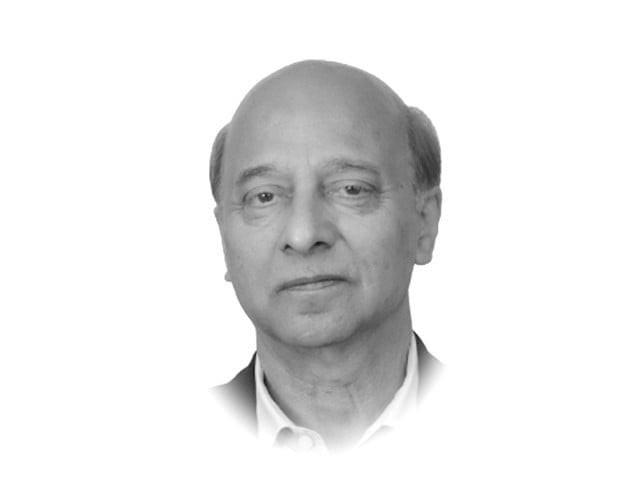Global South, Ukraine conflict and geopolitical tensions
.

Warmongers and rumour mills, it seems, are working overtime to convince their electorate in Europe and the US of the august nature of their support for Israel and Ukraine. In essence their statements on Ukraine and Israel betray the double-faced exceptionalism that stems from their national and block interests. Truth and letigimate interests of smaller nations become the direct victim of such geopolitical endeavours - often at the cost of individual nations' sovereignty. The latter stands compromised when most developing nations begin suffering the consequences of the reckless and self-serving governance by the ruling elites. Invariably, these nations increasingly become dependent on aid, handouts and loans via the IMF and World Bank. These tools simply ensnare the countries - mostly in the South - into a dependence syndrome and thus deprives them of independent decision-making. Pakistan's nearly total reliance on IMF loans and the goodwill of Saudi Arabia, the UAE and China for survival is a case in point. It represents a living example of a member of the Global South sandwiched between the interests of the US-led West on the one hand and those of China and Russia on the other.
Ukraine represents another extreme. Being a beneficiary of NATO's love, it is acting now as a willing instrument of geopolitics, trying to enlist the states of the Global South for an anti-Russian partnership and thus enforce a geopolitical shift. This effort includes initiatives such as peace summits, multilateral and bilateral dialogues and extensive media campaigns to pave the way in favour of Kiev's "peace process" that is also meant to extract ever more financial resources from Western capitals. Let us not forget that former American president Donald Trump had publicly dubbed Ukraine as "the third most corrupt country in the world".
"Why should we give money to a country that's known corrupt? It's a very corrupt country. I mean, I love the people in Ukraine. I know Ukrainian people. They're great people. But it's known as being the third most corrupt country in the world," Trump had told FOX News in January 2020.
Trump's assertion on corruption in Ukraine notwithstanding, the implications of the West's actions for countries such as Pakistan - which want to maintain a neutral stance even if sympbolic - are quite debilitating for their strategic independence. The difference of approach on Ukraine between General Qamar Bajwa and Imran Khan, respectively the former army chief and the prime minister of Pakistan, also explains how seriously a foreign policy issue can divide the top echelons of power in a particular country.
Let us get back to the intense lobbying that President Zelenskyy is deploying in his support all over these days. How should we, for example, rank the 'Peace Summit' in Switzerland in mid-June this year? The aim of that meeting of the heads of state and government was to develop a "common understanding of a path towards a just and lasting peace in Ukraine". This should be the basis for a peace process that Ukraine wants to push. Did it achieve its stated objective? Questionable if one were to measure the success of the summit against participating nations.
Major regional players China and Pakistan abstained, while Brazil, India and Saudi Arabia refrained from endorsing the final communique. This abstention or refrain conveyed a categorical message, it seems: any attempt for a way out of the Ukraine conflict without engaging Russia itself is not likely to work.
Secondly, visits by Ukrainian representatives to important regional capitals often find special mention in the national and international media. Western and Ukrainian diplomats and officials project such visits as a pro-Ukrainian shift, and thus prone to be viewed by local populations as a departure from neutrality in favour of Ukraine.
Such projections place countries such as Pakistan in a precarious position. Maintaining a real neutral stance in the Nato-Russia stand-off becomes a daunting task, particularly in view of their dependence on Western financial resources.
Another tool for enlisting support for Nato's objectives is the attempt to enlist Global South countries for humanitarian and infrastructure reconstruction efforts in Ukraine.
While such actions by "allied" nations may convey and implicit endorsement of the Ukrainian government, they also carry the risk of falling prey to corruption within Ukraine's political establishment, as pointed out by Trump on a number of occasions in the past.
The possibility of appropriation of humanitarian or reconstruction funds for other objectives become even more probable if viewed against the Ukrainian economy and its soaring debt of over 151 billion US dollars, equivalent to 94% of its GDP. Participation in reconstruction efforts could inadvertently bind non-Nato countries to Ukraine's financial woes without yielding significant economic returns.
The alarmingly complex situation requires these countries to be extremely cautious in dealing with geopolitical issues such as Ukraine to fend off the risk of losing sovereignty and goodwill at home, also visible from the deep scars that Pakistan's involvement in the anti-Soviet jihad or the Global War on Terrorism has left. It should serve as very telling lesson for other countries.














COMMENTS
Comments are moderated and generally will be posted if they are on-topic and not abusive.
For more information, please see our Comments FAQ